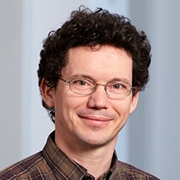Wendelin Werner

Wendelin Werner
2006 Fields Medal
Professor Wendelin Werner believes there are two types of mathematicians—those driven by application and those driven by a curiosity to unravel the abstract ideas of the world around us. Prof Werner is the latter. The German-born French mathematician currently resides in Switzerland as a professor of mathematics at the Swiss Federal Institute of Technology, or ETH Zürich.
In 2006, Prof Werner was awarded a Fields Medal “for his contributions to the development of stochastic Loewner evolution, the geometry of two-dimensional Brownian motion and conformal field theory” according to the International Mathematical Union who awards the medal. In short, Prof Werner’s work contributes to defining and proving randomness.
From 1999 to 2003, much of Prof Werner’s time was spent working with major collaborators, Professor Greg Lawler and Professor Oded Schramm—albeit online. The paper that won him the Fields Medal was a result of this collaborative effort. Without the convenience of zoom video calls, all communication took place over e-mail. The three researchers were also based in different corners of the world, making discussions across time zones similar to passing a baton.
For Prof Werner, collaboration is important, but best executed in small groups. He finds that talking with colleagues about a topic he is stuck on helps him formulate his own thoughts and realise new ideas he had not previously considered.
When Prof Werner, Prof Lawler and Prof Schramm were able to meet in the same country, they would find time to get out of the lab and discuss problems that they were stuck on. Prof Werner described these discussions as ‘ping-pong’ conversations, where everyone contributed and it felt as though their minds were connected. He recalls a specific conversation that took place while walking down a hill towards the Mathematical Sciences Research Institute in San Francisco. They walked along a scenic route and talked about a particularly pressing problem—by the time they reached the bottom of the hill, they had their answer.
When asked if he had any advice for young mathematicians, Prof Werner included a caveat, saying that he cannot judge if his experiences are still valid because of how rapidly the research landscape is changing. Nonetheless, he urges young researchers to be authentic and earnest—building on who they are and what they know to contribute to the field.
Since receiving the Fields Medal, Prof Werner has been awarded the SIAM George Pólya Prize in 2006, elected to the French Academy of Sciences in 2008 and made an honorary fellow of Gonville and Caius College in 2009.

